Diplomatic Bluebook 2019
Chapter 2
Japan's Foreign Policy that Takes a Panoramic Perspective of the World Map
Section 7 Africa
1 Overview
Africa, with a population of over 1.2 billion in 54 countries, has attracted the interest of the international community, owing to the high market potential and rich natural resources. Also, in the political sphere, Africa's influence in the international community is growing and many countries successfully had democratic transitions in 2018. Progress was made toward economic integration, for example, the signing and establishment of the African Continental Free Trade Area (AfCFTA)1 by 44 countries in March. In addition, Africa's own efforts are being made to resolve disputes, including efforts toward stabilizing the region by the G5 Sahel (Mali, Mauritania, Burkina Faso, Niger, and Chad), moves to stabilize the Horn of Africa such as the normalization of relations between Ethiopia and Eritrea, and South Sudan's new peace agreement by the mediation of organizations such as the Inter-Governmental Authority on Development (IGAD).
On the other hand, in addition to long-standing challenges such as political unrest, severe disparities, and poverty, other challenges have emerged, including the vulnerable health systems, the rise of violent extremism, the lack of employment mainly affecting youth, and the deteriorating financial and investment climate due to increasing public debt in some countries. Overcoming these challenges is crucial for peace and stability of the international community as a whole.
In 1993, Japan started the Tokyo International Conference on African Development (TICAD), under the principles of respect for African ownership and partnership with the international community. Since then, with other co-organizers such as the UN, the UN Development Program (UNDP), the World Bank (WB) and the African Union Commission (AUC), Japan has supported Africa's efforts.
At TICAD VI held in August 2016 in Nairobi, Kenya, Prime Minister Abe announced that for a period of three years from 2016 to 2018, Japan will invest in the future of Africa through the implementation of measures including human resource development to 10 million people, amounting to approximately 30 billion US dollars under public-private partnership.
Foreign Minister Kono, State Minister for Foreign Affairs Sato, Parliamentary Vice-Minister for Foreign Affairs Yamada, and Parliamentary Vice-Minister for Foreign Affairs Tsuji were among those who attended the TICAD Ministerial Meeting held in Tokyo in October 2018. In addition to confirming the progress of initiatives announced at TICAD V and TICAD VI, they reaffirmed to secure international standards in aid, such as debt sustainability and to promote public-private partnership, and held discussions in preparation for TICAD 7, which will be held in Yokohama in August 2019.
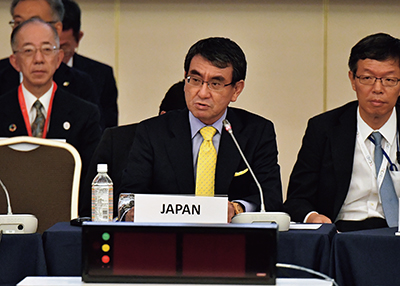 Speech by Foreign Minister Kono at the opening session of the TICAD Ministerial Meeting (October 6, Tokyo)
Speech by Foreign Minister Kono at the opening session of the TICAD Ministerial Meeting (October 6, Tokyo)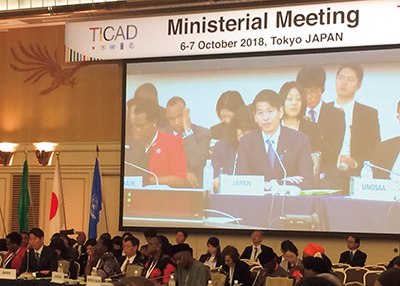 Speech by Parliamentary Vice-Minister for Foreign Affairs Yamada at the plenary session of the TICAD Ministerial Meeting (October 7, Tokyo)
Speech by Parliamentary Vice-Minister for Foreign Affairs Yamada at the plenary session of the TICAD Ministerial Meeting (October 7, Tokyo)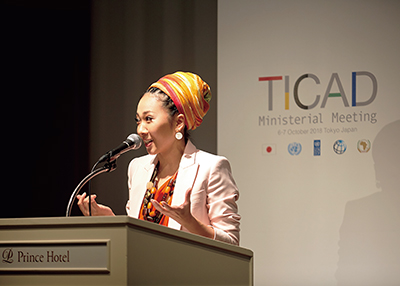 Remarks from singer MISIA, appointed TICAD 7 Honorary Ambassador (October 6, Tokyo)
Remarks from singer MISIA, appointed TICAD 7 Honorary Ambassador (October 6, Tokyo)Japan has been strengthening its efforts in the field of peace and stability. It continues to deploy staff officers to the UN Mission in South Sudan (UNMISS) while supporting to enhance UN peacekeeping operations (PKOs) capabilities in African countries. Japan and the Nippon Foundation co-hosted the Core Group Meeting of Eminent Persons Group on Peace and Stability in Africa in August, where five former African Heads of State2 were invited. It was also attended by Former Prime Minister Mori and Yohei Sasakawa, Chairman of the Nippon Foundation. Following remarks from Prime Minister Abe and Foreign Minister Kono, the participants from both Japan and Africa had discussions on several topics, including challenges which should be tackled by Africa itself in order to ensure peace and stability in Africa, and the participants expressed expectations for Japan's assistance in areas such as institution building.
On the economic front, the Japan-Africa Public-Private Economic Forum was held in May in Johannesburg, South Africa, in response to the high expectations of Japanese companies to expand their business activities into Africa. Minister of Economy, Trade, and Industry Seko, Parliamentary Vice-Minister for Foreign Affairs Okamoto, and Parliamentary Vice-Minister for Ministry of Land, Infrastructure, Transport and Tourism Takahashi attended the forum. The business opportunities and challenges were discussed between Governments of Japan and African countries, private companies, and international organizations, and 16 memorandums were introduced on this occasion.
Japan dispatched the Public-Private Sector Joint Mission for Promoting Trade and Investment to Rwanda and Zambia in July, headed by Parliamentary Vice-Minister for Foreign Affairs Manabu Horii. In addition, at the TICAD Ministerial Meeting in October, Deputy Chief Cabinet Secretary Nishimura hosted a breakfast meeting in which Japanese companies and ministers from eight African countries were invited, where they exchanged views on public-private partnerships in preparation for TICAD 7. Discussions are also underway to conclude investment agreements with eight countries.
Japan is planning to further strengthen cooperation with the African Union (AU) and African countries particularly through efforts such as the establishment of the Mission of Japan to the African Union in the beginning of 2018. Japan is also working to share information and conduct policy coordination with third countries including the U.S., the UK, France, and India, through policy consultations on Africa.
- 1 44 countries signed at the extraordinary summit meeting of the African Union (AU) held in Kigali in March. It establishes AfCFTA and could become one of the largest FTAs with a total population of 12 billion and GDP of 2.5 trillion US dollars if it is ratified by the remaining 22 countries. 49 countries have signed as of January 2019.
- 2 Former President Chissano of Mozambique, former President Soglo of Benin, former President Mkapa of Tanzania, former President O.basanjo. of Nigeria, and former President Mbeki of South Africa participated from Africa.
The Seventh Tokyo International Conference on African Development (TICAD 7) will be held in the City of Yokohama, Kanagawa on August 28 to 30, 2019. TICAD is an international conference co-organized by Japan with the UN, the United Nations Development Programme (UNDP), the World Bank and the African Union Commission (AUC). It brings together representatives from African countries, related countries, and civil society to discuss development in Africa.
Various events will take place in Yokohama ahead of TICAD 7. In 2019, the whole city of Yokohama will be filled with a strong atmosphere of Africa in 2019 as Japan's “Closest City to Africa.”
This will be the third time that TICAD will be held in Yokohama. In keeping with the city's theme of “Africa and Yokohama, Sharing Passion for the Future” for TICAD 7, Yokohama is working on activities in three areas: expanding international technical cooperation, boosting business support and promoting participation by women, and enhancing civic exchange activities and fostering the future generations.
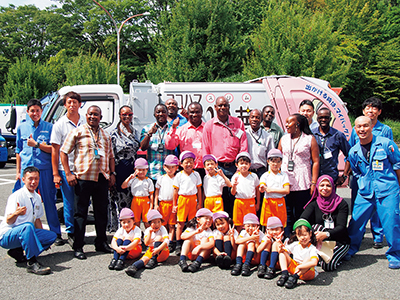 Waste management seminar (August 16; Photo: City of Yokohama)
Waste management seminar (August 16; Photo: City of Yokohama)In international technical cooperation, delegations from various African countries have been coming to Yokohama to learn about areas such as water supply and ports, amid growing interest in urban issues related to rapid population growth. Yokohama participated in the Africities Summit (Morocco) held in November 2018 and delivered a presentation on its experience with urban development to an audience of over 3,000 participants. Additionally, Yokohama conducts seminars to introduce its experience with and technologies for waste management through the African Clean Cities Platform established jointly with the Ministry of the Environment, Japan International Cooperation Agency (JICA), and various African countries. The Platform is scheduled to hold its second annual meeting in Yokohama at the same timing at TICAD 7.
In business assistance, Yokohama gives a boost to doing business with Africa, for instance, holding seminars that introduce the business environment in Africa and encouraging local companies in the city to receive African students who are studying in Japan through the African Business Education Initiative for Youth (ABE Initiative) as interns. Through these efforts, some of the participating companies have newly entered the African market and others have employed African students in Japan supported by the ABE Initiative.
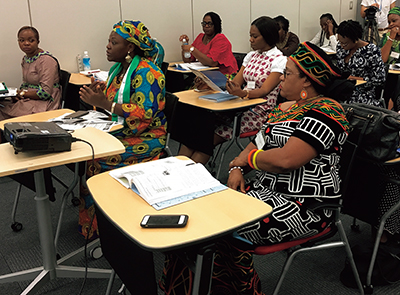 Seminar for African Women Entrepreneurs (August 23; Photo: City of Yokohama)
Seminar for African Women Entrepreneurs (August 23; Photo: City of Yokohama)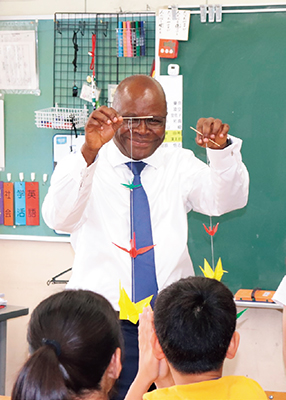 One School, One Country program on African countries (June 20; Photo: City of Yokohama)
One School, One Country program on African countries (June 20; Photo: City of Yokohama)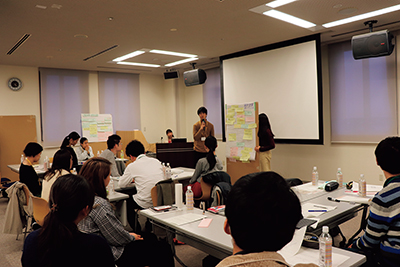 Student Conference on African Development in Yokohama (December 8; Photo: City of Yokohama)
Student Conference on African Development in Yokohama (December 8; Photo: City of Yokohama)In promoting the active participation of women in society, Yokohama cooperated with JICA to implement the Japan-Africa Business Women Exchange Program from 2014, following discussions at TICAD V, in which female entrepreneurs and government officials from African countries visit Yokohama and exchange views. At the Emerging Women Entrepreneurs Forum, which Yokohama hosted with JICA in August 2018, Mayor Fumiko Hayashi called for action to promote further active participation of women in society.
With regard to the initiatives to develop the future generation, Yokohama is promoting young people's understanding of and interaction with Africa. The “One School, One Country” program has been conducted as part of such initiatives, and in this program 74 elementary and junior high schools in Yokohama are holding exchanges with 33 African countries (as of December 2018) through school visits by African Ambassadors and other events. In June 2018, the Minister of Foreign Affairs and Cooperation of the Republic of Benin visited Kasama Elementary School during his visit to Japan. He enjoyed a school meal, received a tour of school cleaning activities, and was also greatly impressed by the students' presentations on what they learned about Benin and their performance of Benin's national anthem in French. Yokohama also launched the Student Conference on African Development in Yokohama, a project to discuss issues facing Africa, at which roughly 70 university and graduate students from 17 universities carried out group work on specific issues.
These initiatives by Yokohama are further deepening the connection between Japan and Africa and offer an excellent example of regional collaboration. The Government of Japan will work closely with Yokohama in preparing toward TICAD 7 so as to make the conference even more fruitful, and make efforts for its success.

